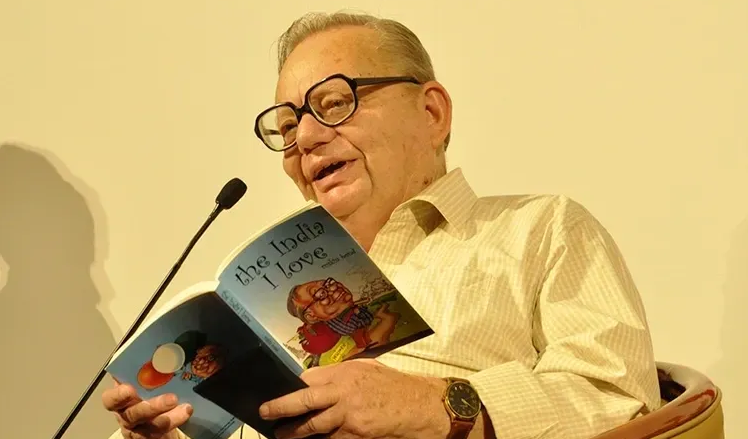It is a rarity for a nonagenarian to survive, thrive, think, navigate the modernity in all its hues and still maintain a steady stream of his literary jaunts in order to convert the same in his masterpieces of literary work for decades to no end. Five decades of relentless thinking through his fingers has neither blunted his fingertips nor has dulled his passion to regale his readers with back to back superlative stories that catch attention from a school going kid to a housewife and equally to humongous other sections of Indian as well as foreign readership. Who else than the inimitable Anglo-Indian ‘Ruskin Bond’ can do a perfect somersault in his literary works portraying the decades of 1940s/ 50s which he lived, smelled and jelled bringing them to life to the present day 2025 with such élan and dexterity?
The day of 19th May 2025 which passed away quietly from the calendars of the world, ushered in the one and only of his kind of writer in India to his 91st (ninety first) birthday, which I am quite sure none else of his ilk walking presently on the Indian terra firma will ever achieve or emulate not only his literary but also his humanitarian feats. Still living through his literary works that are so ubiquitous by their presence spanning the best of book fairs in the country to the ‘AH Wheeler & Co’ Indian book chain stores spread all over Indian railway stations & airports, puts an unequivocal stamp of literary genius on Ruskin Bond which is difficult to erase.
It is through this write up of mine from the pages of ‘Rising Kashmir’ that I intend to pay an ode to one of the master class of writers of Anglo-Indian origin who despite not belonging to this sub-continent by his parentage still chose to make India as his home and is regaling countless millions of Indians by his stories. On 91st (Ninety first) birthday, the ‘Padma Bhushan’ and ‘Sahitya academy’ fellowship awardee rang out his celebrations by cutting a cake with his close family members at his home in the verdant climes of Ivy cottage ‘Landourcantt’ ( Mussoorie).
This year his celebrations wore an air of somberness & simplicity coming as it is in the wake of the dastardly ‘Pahalgam’ attacks, which the venerated author took a step ahead by cancelling his annual meeting of his fans personally at the famous ‘Cambridge book store’ in June. What a nationalistic Indian to the core. Born on 19th May 1934 in Kasauli, Punjab of British India, however Ruskin Bond has been living in Mussoorie since 1963.
On this day, Ruskin Bond released his new book—‘Life’s magic moments’ a collection of peaceful and contemplative thoughts from his life that he spent with his late father . It is truly amazing that at age 91, Ruskin is still in the pink of his mental faculties and has within him still the spunk to give a new writer a run for his money by churning out the new masterpiece as mentioned above.
Bond’s birthday is a special occasion in Mussoorie when his fans get together to congratulate him and spend time with him. His sheer presence and literary works have catapulted the hilly paradise of Uttrakhand into a last stop destination for literature aficionados. Ruskin Bond is that last vestige of ‘Raj days’ which is now almost on the verge of extinction; hence the loss for the masses when this vestige too is gone in the great abyss of time.
Ruskin Bond’s life is one that has borne the unmistakable stamp of simplicity, nature immersed and writing centric. Ruskin writes in one of hislatest book ‘The hill of enchantment-story of my life as a writer’ that at age twelve (12) , he cut his teeth into the literary world—quote—‘It wasn’t a story so much as a day to day account of his school activities with sidelights on friends, classmates and teachers. This early work , written in a couple of school exercise books disappeared from my desk—taken and probably flung away by a prankster , or even confiscated by a teacher’’ Unquote.
This gave a rare glimpse of his marshaling of thoughts, people, places, timings early on in life that is so very essential for making a writer of repute. Shaped partly by the circumstances of his birth during the turbulent times of 2WW and more so due to the cloak of loneliness that became his destiny after separation of his parents and subsequent death of his father at age ten, Ruskin was born of a different genre. Although Ruskin’s literature is mostly set in the ‘Dehradun-Mussoorie’ foothills, his childhood was spent briefly in Delhi during the war years from 1942 to 44, when quest for Indian independence was at its peak.
Having seen, felt and lived through those turbulent times which India went through, inherently kicked in a nationalistic streak in the persona of Ruskin which was visibly observed recently when as mentioned above he unilaterally abstained from celebrating his birthday in a grandiose fashion.
Making common cause with the Pahalgam victims anguish and abjuring from a boisterous birthday bash, Ruskin has a unique side to his personality that contains oodles of humanity caught early in the late 1950s. It was not for nothing that despite India having a surfeit of human right activists, Ruskin Bond in 1959 while working with the ‘CARE relief’ barely 25 years old lead the way for identifying and instilling ways and means to rehabilitate Tibetan refugees who had fled along with their spiritual leader HH Dalai Lama under the relentless onslaught of Chinese army.
This American relief organization with whom Ruskin was working sent him to Dalhousie to assess the needs of the Tibetan refugees. For the US relief organization with the express approval of government of India to choose a literary man who was still in the process of earning his spurs in the related field help find the hapless Tibetans their feet on the Indian soil speaks of Ruskin’s humanitarian side that most of Indians are not aware of.
Despite self having served with the Tibetan soldiers in SFF for a considerable period of time , I was not aware of the deep seated connection of Ruskin Bond with these high landers till the time I went to Dalhousie ( HP) in the year 2005 on a vacation. In Dalhousie, one of the best maintained Himalayan townships that still has been able to retain the old world charm of ‘Raj days’ stands the testimony of Ruskin’s connection with Dalhousie, the Tibetans and his softer side of humanity in the form of a ‘carpet weaving center’ where he was able to integrate many Tibetans into this trade.
A passing reference has been made of his efforts in his book—‘Rhododendrons in the mist’. ‘Memory is a writer’s best friend’, Ruskin writes in one of his latest literary works, a charming collection of vignettes and ruminations drawn from a life lived quietly, gracefully and always on his own terms. So far so good.
Most of the readers may not be aware of certain fascinating truths of Ruskin’s life that include his being taught by world famous Hindi playwright Mohan Rakesh at the famous ‘Bishop Cotton School in Shimla. That Ruskin was once mistaken for being an American spy by the CID of India in Dalhousie , that he rented a cottage in Mussoorie for RS 400 a year in 1963 and that is where he wrote ‘The blue umbrella and angry river’ and so on.
For a stalwart of Ruskin’s stature, it is difficult to encapsulate all his fineries in writing in one single article. Suffice it to say in the words of Ruskin —‘Writers don’t retire, do they? They say old soldiers never die, they only fade away. Similarly old writers never die, they simply go out of print.’
(The writer is a retired army officer and a regular scribe of Rising Kashmir. He can be approached on his email at: [email protected])







